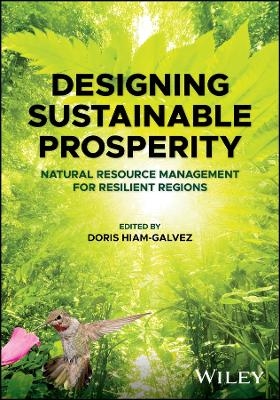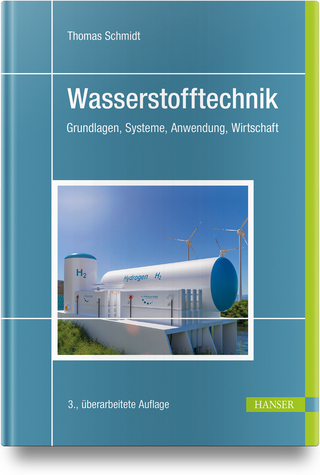
Designing Sustainable Prosperity
John Wiley & Sons Inc (Verlag)
978-1-394-25329-6 (ISBN)
Designing Sustainable Prosperity (DSP) is a step by step blueprint for transforming economies from being dependent on short term natural resource extraction into long-term sustainable prosperity. The outcome is the creation of sustainable, circular economies that prioritise waste reduction and use recycling and renewable resources to actively implement climate change solutions. A key feature of the process is collaboration between local people, investors, appropriate experts, government and academics.
The DSP method outlines seven steps in creating a plan for long-term sustainable regional development, illustrated by several case studies from North and South America which identified potential economic transformations.
Designing Sustainable Prosperity explores topics such as:
How to determine if and when a region is ready for DSP by analyzing factors such as climate, geology, natural resources and human potential
Case studies highlighting different aspects of the DSP approach, and how to achieve true prosperity which is beyond short-term financial performance
“Hard” resources and industries that can fuel a circular economy, such as metals/mining, water/ energy, value added food products and other innovative enterprises
“Soft” enabling factors such as workforce availability, educational systems, and socio-economic conditions and how to develop these factors in line with the United Nations Sustainable Development Goals (UNSDGs)
DSP shows how to align economic goals with all the UNSDGs. Designing Sustainable Prosperity is an essential and timely resource for professionals and organizations aiming to develop regions sustainably.
“Not only a great collection of ideas and references but also a great story in terms of how it brings the pieces together and guides how we can each make a difference.”
—Mark Cutifani, Chairman Vale Base Metals, Former CEO at Anglo American plc
“Recommended for corporations, politicians and regulators to understand the sequencing necessary to access the energy transition metals and realize 2050 aspirations in a sustainable manner.”
—Robert Quartermain, DSc, Canadian Mining Hall of Fame Inductee, Co-Chair Dakota Gold Corp, Former Executive Chairman Pretium Resources Inc
“Presents an optimistic, “bottom up” collaboration recipe that leavens outside expertise with community-based history, capabilities, and ambition to move in new directions.”
—David J. Hayes, Professor at Stanford University, former senior White House climate advisor for President Biden and the Deputy Secretary and Chief Operating Officer of the U.S. Department of the Interior for Presidents Obama and Clinton
Doris Hiam-Galvez is Senior Advisor at Hatch Consulting, Board Director for the Prospectors & Developers Associations of Canada, and an outspoken champion of sustainable development. She has a PhD in Metallurgy with broad senior level experience in leading organizations and driving significant expansion globally focused on value creation. For the past 16 years, her activities at Hatch involved leading regional operations and creating new and innovative businesses in Australia, South America, Europe and North America.
List of Contributors xi
Preface: My Journey Into Sustainability xiii
Endorsements xv
1 Executive Summary 1
Doris Hiam- Galvez
High Level Case Studies 3
Southern Peru 3
Ring of Fire 3
Quebec 3
Northwest British Columbia 4
Reference 4
2 Introduction 5
Doris Hiam- Galvez
References 7
3 Metals – A Key to the Future 9
John Hiam and Doris Hiam- Galvez
Reimagining Mining 10
In Situ Recovery – A Possible Alternative Mining Method 10
Integrating DSP into Mining Projects 11
Metal Production and Applications 13
Steel Production 13
Manufacturing of Goods and Design for Recyclability 14
References 15
4 Sustainability – Climate Change and Environment 17
John Hiam and Doris Hiam- Galvez
Climate Change 17
Environment 19
References 23
5 Prosperity Beyond Financial Performance 25
Allan Moss, Brittany MacKinnon, and Doris Hiam- Galvez
What is Prosperity? 25
What Happens After the Extractive Industry? 25
Why UN SDGs for Sustainable Development? 26
Why is DSP Aligned with the UN SDGs? 26
How Does DSP Relate to the UN SDGs? 28
But, What About Financial Performance? How Does DSP Impact Return on Investment? 30
References 31
6 Nature’s Hidden Gifts – Envisaging the Unseen Beneath Our Feet 33
Richard Blewett and Doris Hiam- Galvez
What is Geology? 34
A Shaping Force 35
Seeing the Unseen 35
How Does Seeing the Unseen Deep Geology Help with DSP? 37
Mineral Diversity 37
Energy Diversity 38
Helium 39
Storage 39
Groundwater in the Water Cycle 40
New Ways of Metal Mining 42
Knowing the Unknown –An Aid for Infrastructure Planning 43
Final Words 43
References 43
7 The Method – Designing Sustainable Prosperity 45
Doris Hiam- Galvez
Introduction 45
Essence of the Method 45
Mining as a Catalyst for Economic Diversification 45
Significance and Impact of the DSP Approach 47
Pioneering the Knowledge Economy 48
Planning Process 48
Phases of the Planning Process 49
Key Design Inputs 51
Integrated Natural Resources Model 51
Socio-Economic, Environmental and Cultural Inputs 53
Market Study 55
The Journey of Seven Steps 58
Step 1 – Igniting Potential 58
Step 2 – Vision for the Region 60
Step 3 – Facts and Breakthroughs 60
Step 4 – Solutions System 63
Step 5 – Path of Impact 66
Step 6 – Relevant Education 67
Step 7 – Action and Maintaining the Momentum 67
Implementation 68
References 69
8 Case Studies 71
Doris Hiam- Galvez, Lily Lai Chi So, and Richard Blewett
Introduction 71
Solar Powered Southern Peru Economy 74
Summary 74
Current State 75
Untapped Potential 77
Challenges and Risks 78
Potential Future Offered by DSP 78
System Solutions 80
Conclusion 80
Caring for Country – From Dust to Wonder: Uncovering Hidden Potential 82
Northern Ontario’s ‘Ring of Fire’ – A Nature Positive Solution 87
Summary 87
Current Situation 88
Untapped Potential 88
Challenges and Risks 89
Potential Future Offered by DSP 90
Conclusion 92
Northwest British Columbia – Low Carbon Solutions Hub 93
Summary 93
Current State 93
Untapped Opportunities 94
Challenges and Risks 95
Potential Future Offered by DSP 96
Conclusion 99
Quebec Region, Canada – An Integrated Green Energy System 99
Summary 99
Current State 100
Market Needs 101
Untapped Opportunities 101
Challenges and Risks 102
Potential Future Offered by DSP 103
Conclusion 104
Peru’s Sechura Desert, Peru – A Circular Industrial Cluster 105
Step 1: Industrial Diversification Design 106
Step 2: Sustainable Expansion 106
Step 3: Education, Training and Socio-Economic Development 107
References 108
9 Education, the Lighting of a Fire 111
Anthea Kong, Jake Wyman, and Doris Hiam- Galvez
Early Schooling 111
Fundamentals 112
Encouraging Curiosity 113
Connecting with Nature 115
Retraining and Upskilling 117
References 119
10 Future Society 121
Matthew Tutty and Doris Hiam- Galvez
Is a Utopia Possible? 122
Highlighting the Past 123
References 125
Embracing Change: A Call to Action 127
Reference 128
Index 129
| Erscheinungsdatum | 11.08.2024 |
|---|---|
| Verlagsort | New York |
| Sprache | englisch |
| Maße | 175 x 252 mm |
| Gewicht | 340 g |
| Themenwelt | Naturwissenschaften ► Biologie ► Ökologie / Naturschutz |
| Technik ► Umwelttechnik / Biotechnologie | |
| ISBN-10 | 1-394-25329-X / 139425329X |
| ISBN-13 | 978-1-394-25329-6 / 9781394253296 |
| Zustand | Neuware |
| Informationen gemäß Produktsicherheitsverordnung (GPSR) | |
| Haben Sie eine Frage zum Produkt? |
aus dem Bereich


